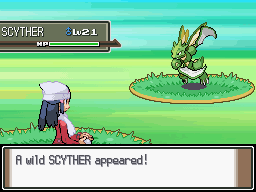
“A wild Scyther appeared!”
“At last, I’ve spent ages looking for one of these… Go! Pikachu!”
“Scyther used Agility!”
“Pikachu used Thunder… But it failed!”
Annoyed sigh
“Scyther used Strike with the Back of the Sword”
“… Wait… WHAT?! What kind of move is that?! The name barely even fits my screen!”
Transcreation, I Choose You!
Did my literal translation suddenly break your sense of escapism? One minute you’re catching a Pokémon called Scyther, and the next, you’re confronted with awkward, slightly alien language that brings you crashing back to reality, ruining your immersive experience.
To avoid situations like this, translators use a technique called ‘transcreation’, which is better understood when you break the word in two: a creative way to translate. The translator focuses on replicating the function of the original text and gives less priority to more literal translation options. The text should have an equivalent impact on its target audience as the original had on its audience, meaning gamers remain immersed – as if the game had never been translated at all.
To put this into context, the ‘Strike with the Back of the Sword’ move was simply translated as ‘False Swipe’ in English, losing its reference to a phenomenon in Japanese swordplay: striking with the flat (apparently non-lethal, but I’m not going to try it) side of a katana sword. This likely would have been lost on English-speaking gamers (unless, of course, you are the Karate Kid), so the translators found a workaround that still implied non-lethality but which deviated from a more literal reproduction.
Text Fidelity or Functionality?
Another example of ‘compromise’ and, staying with our ‘swords and Pokémon’ theme, we have the move ‘Aerial Ace’, which – if translated literally – would have been called ‘Swallow Return’. The name in Japanese references a Japanese sword technique (‘Turning Swallow Cut’), named for its similarity to a swallow’s tail in flight. But once again, this phenomenon is unknown in English-speaking cultures, so the translation team instead opted for something that replicates the connotations of the original term: speed and flight.

You see, when confronted by this type of ‘obstacle’, translators find themselves in a tug-of-war between ‘text fidelity’ and ‘functionality’. And this is precisely where they earn their money, as they’re often trying to find an efficient balance between the two. And it’s not just about enabling comprehension. It could also be a joke that just isn’t funny when translated literally. Or an emotion the translation must elicit. Suddenly translators become the comedians or a psychologist, looking for a suitable equivalent.
Creative and Functional
The character Lappy – from the fantastic Astral Chain – is a good example of this. In the original Japanese, the character’s voice actress spoke with a slightly higher pitch and inserted a few extra “-ppy” sounds at the ends of words. This was to make her character appear funnyppy and friendlyppy.

But this effect just sounds awkward in English. So, the localization team needed to find a creative and functional replication of these features. One solution was to give Lappy a signature phrase where she called everybody ‘partner’. Additionally, the voice actress decided to speak with a rural, southern US accent, which made English-speaking Lappy come across as a fun character who broke up the game’s dark tone with a comical respite. Mission accomplished!
Transcreation at Its Finest
Ironically, it’s usually a testament to the skill of translators when the audience doesn’t notice their work. But spare a thought for them because, to use another Pokémon analogy, it’s their use of transcreation that captivates gamers, like a ‘Master Ball’, by making text feel ‘non-translated’ and tailor-made to the target audience – meaning Pikachu’s unreliable ‘Thunder’ attack is at the center of attention, rather than any awkward words on the screen.



